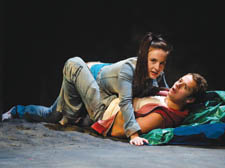|
|
 |
| |

Pearl (Jade Williams) and Joe (Alex Waldmann) |
Lovelorn ‘gorger’ king and his gypsy queen
SHRADDHA
Soho theatre
ROMANY gypsies, like the shtetl Jews of times of yore, inhabit the same realm of our imaginations as mythical creatures. They are like characters from folklore, and whether they are being persecuted like witches or idealised like unicorns, they always seem wrapped up in secrets they themselves may not understand.
Natasha Langridge’s play Shraddha (a Romany word which translates as “faith” or “you are what’s in your heart”) is a commendable attempt at portraying a people about whom there is much ignorance.
What it does best, or in any case better than drawing conclusions, is exciting imaginations about that Romany mystique without romanticising these people in the process.
It does this largely by way of lyrical dialogue, peppered with Romany words, some of whose meaning becomes clear while others remain opaque, and punctuated by wild music.
The plot focuses on a community who have the misfortune of having set up camp in an area near Hackney Wick destined to become the site of the 2012 Olympics, and who are ordered by Hackney Council to vacate their semi-permanent homes to make way for
pole-vaulters and synchronised swimmers (NB: this happened in real life).
But before they up sticks and hit the road in time-worn gypsy fashion, Pearl – a young and earthy “rakli” (woman) takes a fancy, Juliet-style, to Joe, a forbidden “gorger” (non-gypsy).
Intent on winning her, Joe rushes headlong into the world of the Romany, straining to become like them by force alone.
But he fails; there is something too different about the Romany.
And after the two lovers elope together, they clash, her wandering spirit and strange beliefs alienating him.
The acting here is top notch. Not only do Pearl (Jade Williams) and Joe (Alex Waldmann) amaze with their passion, but the actors playing the minor characters – Joe’s browbeaten father (Jim Pope), Pearl’s weary old gran (Anna Carteret) and her mother Ann (Miranda Foster) – score themselves on your memory with totally believable performances.
Shraddha poses questions about identity, but, as is often the case when such questions are involved, offers few answers. This would not be such a problem were it not that things seem to rather peter out, ending with a whimper – a surprise after scenes of such raw emotion.
Still, it’s a fascinating play and well worth catching.
|

|
| |
| |
 |
|
|
 |
|



